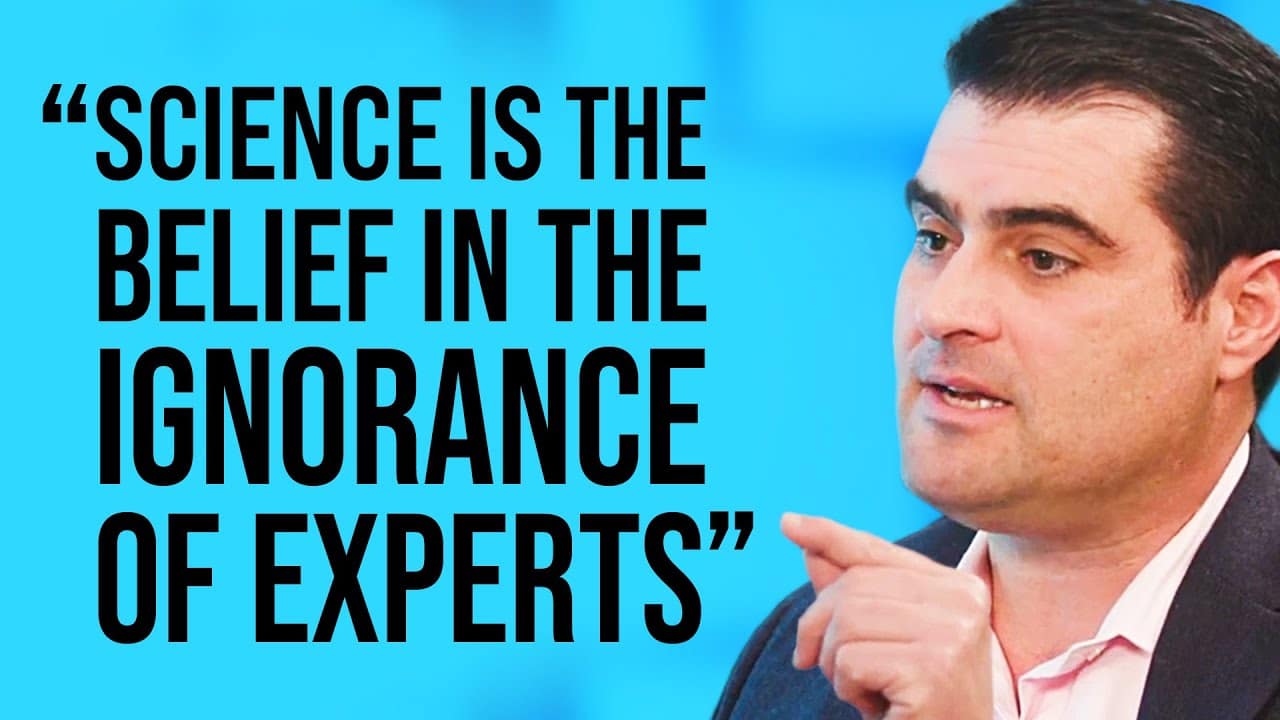*****
Summary of Transcript:
The video discusses the scientific method and its importance in discovering the truth. The host interviews Dr. Brian Keating, a professor of physics who emphasizes the importance of not fooling yourself and being as authentic as possible in the pursuit of truth. They discuss how all scientists have biases and peccadillos as humans, but the scientific method helps to minimize those biases. The truth is important because it anchors us to reality, and the more delusional a person is, the more likely they are to be happy. The scientific method is a way of not fooling oneself, ensuring authenticity in the pursuit of truth.
*****
Summary of Description:
In this episode of Impact Theory with Tom Bilyeu, Professor of Cosmology Dr. Brian Keating explores the question of what it means to go “into the impossible” and how to shatter limiting beliefs around human capability. Through the lens of the pursuit of the Nobel Prize, Dr. Keating discusses the scientific method, motivation for achievement, and the curse of knowledge. He also touches on the importance of truth and organization in harnessing energy and creating something grand. Ultimately, Dr. Keating believes that the pursuit of science is an infinite game that cannot be won, but it is magical nonetheless.
*****
Shattering Limiting Beliefs Through the Pursuit of the Nobel Prize: Dr. Brian Keating’s Perspective
What does it mean to go “into the impossible”? For Professor of Cosmology Dr. Brian Keating, it’s all about breaking down the barriers of limiting beliefs around human potential. In his latest book, Into the Impossible: Think Like a Nobel Prize Winner, Dr. Keating takes readers on a journey to understand what it takes to push boundaries beyond what humanity thought possible. In today’s episode, Dr. Keating chats with Tom Bilyeu on Impact Theory about his book, scientific pursuit, and what drives people to pursue the highest levels of achievement.
The Power of The Scientific Method
The scientific method is a hallmark of scientific inquiry. Dr. Keating explains how it is a systematic approach to problem-solving where you make an observation, form a hypothesis, and test it with experiments. He shares how the scientific method helps scientists stay grounded in their search for truth, and how an important part of scientific inquiry is accepting what is not wrong instead of asserting what is right.
What is Truth, and Why Does it Matter?
The search for truth is a fundamental part of scientific inquiry. Dr. Keating goes into detail about what truth is and why it matters. He highlights how truth keeps us grounded in reality and how differing versions of relative truth can lead to chaos.
The Scientific Method: Inductive vs. Deductive
Inductive and deductive reasoning are two approaches to scientific inquiry. Inductive reasoning is the process of arriving at a general conclusion based on specific observations. Deductive reasoning is the process of arriving at a specific conclusion based on general observations. Dr. Keating explains how both are used in scientific inquiry.
Brian’s Origin Story
Dr. Keating shares his origin story and how the science of cosmology sparked a passion in him. He explains how he followed his curiosity to pursue his passion in science and how it led him to different opportunities.
Losing the Nobel Prize
Dr. Keating shares a personal experience of losing the Nobel Prize and how it turned out to be a blessing in disguise. He highlights how it led him to re-envision his pursuit of science and what he ultimately wants to achieve through his work.
What Drove Brian to Aim At a Nobel Prize
Dr. Keating dives into his motivations and what drove him to aspire to win a Nobel Prize in science. He shares how it was not the prize itself that motivated him but the pursuit of knowledge and understanding.
Brian’s Quest Takes a Turn For The Worse
Dr. Keating’s quest to win the Nobel Prize took an unexpected turn when he made a discovery that turned out to be erroneous. He shares how it was a humbling experience and taught him the importance of self-reflection and humility.
Into the Impossible: Behind the Title
Dr. Keating explains the meaning behind the title of his book, Into the Impossible, and how it represents the idea of exploring the unknown and uncharted territories of science.
Disproportionate Returns & The Curse of Knowledge
Dr. Keating highlights the concept of disproportionate returns and how knowledge can be both a blessing and a curse. He shares how his knowledge in science has opened doors but also presents challenges in communicating complex ideas to those outside of the field.
The Key to Pursuing Something Grand
Dr. Keating shares his perspective on what it takes to pursue something grand, highlighting the importance of passion and curiosity. He explains how passion provides the spark to ignite an afterburner, but curiosity is the fuel that keeps it going.
Scientific Pursuit, Happiness, & Fulfillment
Dr. Keating talks about the relationship between scientific pursuit, happiness, and fulfillment. He shares how the pursuit of science offers a sense of purpose and a way to contribute to society.
The Epistemic Approach to Problem-Solving
Dr. Keating concludes the episode with a discussion on the epistemic approach to problem-solving. He explains how it is a way to examine our biases and identify when we might be fooling ourselves.
Final Thoughts
Dr. Keating’s book, Into the Impossible, offers a unique perspective on pursuing the highest levels of achievement. His story illustrates the importance of remaining humble and pursuing knowledge not for the sake of accolades but for the sake of understanding. Ultimately, his message is a call to break down limiting beliefs and go “into the impossible.”
*****
See Original Source
Source Description
This episode is sponsored by BluBlox. Go to https://blublox.com/impacttheory for 15% off your order or use discount code ImpactTheory at checkout.
Ready to experience Christmas like never before? The 25 Days of Giving has begun!! Get in the full Holiday Spirit with daily experiences and all kinds of prizes. To participate pick up your Merry Modz (https://opensea.io/collection/merry-modz) on OpenSea and join in on the festivities today, you never know what surprises await you next! Learn more on our discord: http://ImpactTheory.com/Discord Official rules: https://merrymodz.io/contest
What does it mean to go “into the impossible”?
For Professor of Cosmology Dr. Brian Keating, it’s all about shattering the limiting beliefs around what a human being is capable of.
In his latest book, Into the Impossible: Think Like a Nobel Prize Winner, Dr. Keating explores this question through the lens of the pursuit of one of humanity’s highest achievements: The Nobel Prize.
Today’s episode is a wide-ranging conversation that touches on everything from the scientific method and first principles thinking, to the motivations that drive people to pursue the highest level of achievement.
Find out more by ordering Dr. Keating’s book here: https://amzn.to/3p3AKeT
SHOW NOTES:
00:00 | Introduction
01:13 | The Power of The Scientific Method
11:41 | What is Truth, and Why Does it Matter?
18:17 | The Scientific Method: Inductive vs. Deductive
29:31 | Brian’s Origin Story
39:11 | Losing the Nobel Prize
47:47 | What Drove Brian to Aim At a Nobel Prize
1:00:46 | Brian’s Quest Takes a Turn For The Worse
1:09:53 | Into the Impossible: Behind the Title
1:20:01 | Disproportionate Returns & The Curse of Knowledge
1:29:48 | The Key to Pursuing Something Grand
1:32:59 | Scientific Pursuit, Happiness, & Fulfillment
1:50:14 | The Epistemic Approach to Problem-Solving
QUOTES:
“Oftentimes, scientists are like kids. Kids are curious, they’re inquisitive, they can be charming, they can be mischievous. They can also be jealous, they can be petty, they can not want to play.” [05:26]
“Truth is what anchors us to reality. If you and I have different versions of reality – of relative truth – I think chaos ensues from that.” [05:43]
“What the scientific method does, is it doesn’t say ‘That’s right.’ It says, ‘That’s not wrong.’” [08:47]
“Energy by itself is meaningless. It’s almost nothing. But organized energy can do anything. And that’s the core principle – that you need organization. Organization implies order.” [14:16]
“Passion is like a spark that can ignite the afterburner, but you need the fuel to keep the afterburner going. And curiosity is that fuel.” [38:22]
“In science, using the scientific method, there should be a little bit of add on, where you check to see, ‘Am I fooling myself?’” [1:06:32]
“Oftentimes people short the human intellect and what we’re capable of doing.” [1:12:05]
“I don’t like this saying, ‘Follow the science.’ Science is supposed to be about questioning authority. And now we’re in this land where you have to follow authority. I think almost nothing could be less scientific than saying ‘Oh, because this particular person like Feynman would say something, that I’m not going to question it.’ He has to be wrong, just as Newton was wrong, just as Galileo was wrong.” [1:15:50]
“Albert Einstein had imposter syndrome. He said that Isaac Newton did more, not only for physics, but for Western civilization, than any person before or since, even including Einstein himself.” [1:19:45]
“This is my meaning of life. I’m gonna do those things that which, if taken away from you, would devastate you.” [1:43:55]
“The great thing about science is you never ‘win’ science. There’s no such thing as winning science. You might win a Nobel Prize or win tenure, or get into a good school. But you’re not winning science, because it’s an infinite game, it cannot be won. That’s what’s so magical about it.” [1:55:19]
Follow Dr. Brian Keating:
Youtube: https://www.youtube.com/DrBrianKeating
Website: https://briankeating.com/
Twitter: https://bit.ly/3E5Y9AE
Instagram: https://bit.ly/3GWYuYt
Order Dr. Keating’s new book, Into the Impossible: https://amzn.to/3p3AKeT



Comments are closed